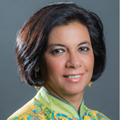IMF Inspired - Bridging the Gender Data Gap
Overview
The session will review the damaging effects of gender data gaps in the workplace, at home, and on government policies, and how the COVID-19 pandemic is exacerbating gender inequality.
Join the conversation via #IMFInspired
IMF Inspired - Bridging the Gender Data Gap
The session discussed a recent book that highlighted damaging effects of gender data gaps in our work, our homes, and our policies, and how the COVID-19 pandemic is exacerbating gender inequality. The discussant described serious implications of the omission of gender disaggregated data in research, which has contributed to policies that adversely impact women in various fields.
key points discussed
-
Curious Case of Gender Data Gap. The discussion focused on some of the most glaring examples of omission of women from data collection and its impact on policies. Perez shared the example of car crash safety tests conducted using a male dummy, overlooking safety or comfort requirements for women, putting them at a higher risk of serious injury or death during a crash. Perez attributed the lack of disaggregated gender data collection to historical biases and a notion that men represent universal idea of humanity.
-
Medicine and COVID Response. Medical research has not collected data on impact of treatments on women, and women are often underrepresented in clinical trials. As men and women react differently to vaccines and drugs, not including them in trials means that we have no way of knowing the impact of these treatments on women. Perez shared it held true in case of COVID-19 pandemic too, where vast majority of countries haven’t published gender disaggregated data, which has hampered finding a treatment for men too. During the pandemic, women have had to share a higher burden of unpaid care work and the economic brunt of the pandemic, resulting in “shecession”.
-
Policy Recommendation. To address the inequalities arising from gender data gap, Perez recommended a few policy actions: investing in a social ecosystem for women; use-it-or-leave-it paternity benefit that enables more women to go back to work and helps to close gender pay gap; and universal child care that enables a better future for children too.
Quotes
“Women are not scaled down men." Caroline Criado Perez
"If you want to measure reality, you need to collect all the data that represents reality." Caroline Criado Perez
"Machine learning just doesn’t reflect our biases back at us, it amplifies them by a significant amount." Caroline Criado Perez
"Algorithms are not humans, we think of them as better than humans; but they are only as good as data we feed them. If we feed them bad data, they are far worse than humans." Caroline Criado Perez
“The pandemic threatens to reverse the gains in women’s economic opportunities, widening gender gaps that persist despite 30 years of progress.” Kristalina Georgieva
Panelists
Opening Remarks: Kristalina Georgieva
 Kristalina Georgieva is the Managing Director of the International Monetary Fund (IMF). She is the first person from an emerging market economy to lead the IMF since its inception in 1944. Before joining the Fund, Ms. Georgieva was Chief Executive Officer of the World Bank and also served as Interim President for a time. Previously, she served at the European Commission as Vice President for Budget and Human Resources – and as Commissioner for International Cooperation, Humanitarian Aid and Crisis Response. She was named “European of the Year” and “Commissioner of the Year” by European Voice for her leadership in the European Union’s humanitarian response to crises.
Kristalina Georgieva is the Managing Director of the International Monetary Fund (IMF). She is the first person from an emerging market economy to lead the IMF since its inception in 1944. Before joining the Fund, Ms. Georgieva was Chief Executive Officer of the World Bank and also served as Interim President for a time. Previously, she served at the European Commission as Vice President for Budget and Human Resources – and as Commissioner for International Cooperation, Humanitarian Aid and Crisis Response. She was named “European of the Year” and “Commissioner of the Year” by European Voice for her leadership in the European Union’s humanitarian response to crises.
Moderator: Sabina Bhatia

Sabina Bhatia is Deputy Secretary of the IMF. Prior to that, she was Assistant Director in the Communications Department. Sabina has a B.A. from Calcutta University and an M.A. in Applied Economics from Johns Hopkins University.
Panelist: Caroline Criado Perez

Caroline Criado Perez is a best-selling and award-winning writer, broadcaster and award-winning feminist campaigner. Her #1 Sunday Times best-selling second book, INVISIBLE WOMEN: exposing data bias in a world designed for men, was published in March 2019 by Chatto & Windus in the UK & Abrams in the US. It has so far spent 20 weeks in the Sunday Times bestseller lists, is being translated into twenty-four languages, and is the winner of the 2019 Royal Society Science Book Prize, the 2019 Books Are My Bag Readers Choice Award, and the 2019 Financial Times Business Book of the Year Award. Caroline was the 2013 recipient of the Liberty Human Rights Campaigner of the Year award, and was named OBE in the Queen’s Birthday Honours 2015. In 2020 she was the recipient of Finland's HÄN award for promoting equality. She is currently working on a follow-up to Invisible Women, called NOW YOU SEE US: how to close the gender data gap and design a world that works for everyone.
Photo: Rachel Louise Brown








